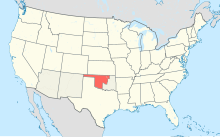35°24′N 97°00′W / 35.4°N 97°W
| Territory of Oklahoma | |||||||||||
|---|---|---|---|---|---|---|---|---|---|---|---|
| Organized incorporated territory of the United States | |||||||||||
| 1890–1907 | |||||||||||
 The Oklahoma Territory (including the Oklahoma Panhandle), shown here together with Indian Territory, Arizona Territory and New Mexico Territory as the last 4 territories to gain statehood in the contiguous U.S. | |||||||||||
| Capital | Guthrie | ||||||||||
| • Type | Organized incorporated territory | ||||||||||
| History | |||||||||||
| 2 May 1890 | |||||||||||
| 16 November 1907 | |||||||||||
| |||||||||||
The Territory of Oklahoma was an organized incorporated territory of the United States that existed from May 2, 1890,[1] until November 16, 1907, when it was joined with the Indian Territory under a new constitution and admitted to the Union as the state of Oklahoma.
The 1890 Oklahoma Organic Act organized the western half of Indian Territory and a strip of country north of Texas known as No Man's Land (now the Oklahoma Panhandle) into Oklahoma Territory. Native American reservations in the new territory were then opened to settlement in a series of land runs in 1890, 1891, and 1893.
Seven counties were defined upon the creation of the territory. They were originally designated by number and eventually became Logan, Cleveland, Oklahoma, Canadian, Kingfisher, Payne, and Beaver counties. The Land Run of 1893 led to the addition of Kay, Grant, Woods, Garfield, Noble, and Pawnee counties. In 1896, the Oklahoma Territory acquired Greer County, Texas when the Supreme Court resolved the boundary case United States v. State of Texas in favor of the federal government. Today, this land in the southwest corner of the state is split into Greer, Jackson, Harmon, and part of Beckham counties.